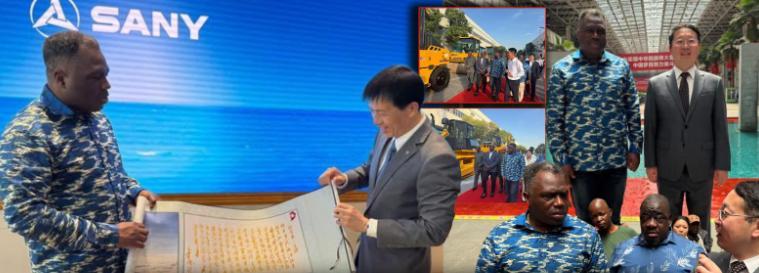Africa-Press – Liberia. Vice President Jeremiah Koung was once credited with salvaging the controversial Yellow Machines deal, a multimillion-dollar equipment procurement that had drawn widespread criticism for its lack of transparency and inflated price. Today, however, the man once hailed as the deal’s fixer is under increasing scrutiny, as fresh developments suggest he may have undermined the very credibility he was tasked to restore.
Vice President Koung has led a high-powered government delegation in China. The purpose is to inspect the factories that are supposedly supplying 285 pieces of construction machinery to Liberia. But what was billed as a final and completed deal is now being called into question, sparking criticism that Vice President Koung has shifted from problem-solver to a central figure in what some are calling an institutional bypass.
The origins of the Yellow Machines saga trace back to May 2024, when a $79 million proposal for the equipment acquisition was quietly introduced by Minister of State Without Portfolio, Mamaka Bility. The proposal was heavily criticized by lawmakers, civil society, and anti-corruption advocates, who cited a lack of legislative approval, transparency, and apparent inflation of costs.
The backlash was swift. Critics slammed the move as unauthorized and fiscally reckless. In response, President Boakai moved to defuse the growing controversy by appointing Vice President Koung to renegotiate the deal.
Vice President Koung’s intervention was, at the time, widely applauded. He announced that the government had restructured the deal at a drastically reduced cost — $22 million payable over three years — and emphasized that it would now be “transparent and fiscally responsible.”
“This is a significant reduction in the cost of acquiring these machines,” Koung told Liberians at a town hall meeting in the United States recently. “We are committed to transparency, fiscal responsibility, and ensuring that every county benefits.”
But Vice President Koung’s current visit to China is shaking that confidence. He is touring the Sany Heavy Machinery Factory in Changsha and the Shantui Construction Machinery Company in Jining — two facilities reportedly involved in the production of the equipment for Liberia.
According to government sources, the visit is part of a “technical inspection” to verify the quality of the equipment and assess the manufacturers’ capabilities. However, this has triggered a wave of criticism and confusion, especially since the government had already declared the deal finalized.
Critics argue that if the deal was truly concluded, such an inspection would have been unnecessary or conducted prior to the announcement. Now, the optics suggest that the process is either still ongoing or being hastily legitimized after the fact — casting doubt on whether Vice President Koung’s “fix” was ever completed to begin with.
More troubling, say observers, is the role — or lack thereof — of Liberia’s procurement institutions. According to the Public Procurement and Concessions Act (PPCA), all major government contracts must pass through several oversight agencies, including the Ministry of Finance, Ministry of Justice, and the Public Procurement and Concessions Commission (PPCC).
Despite these legal safeguards, Vice President Koung — a political actor with no official procurement mandate — has been at the forefront of both the renegotiation and the factory inspections. The PPCC, which should play a lead role in reviewing and approving such deals, has remained conspicuously silent throughout the process.
Even though the PPCC Executive Director, Bodger Scott Johnson, is reportedly part of the China delegation, the Commission has not issued any public statement clarifying its role or whether it signed off on the renegotiated terms. That silence has fueled growing suspicions that proper procurement channels were bypassed in favor of political expediency.
The inconsistencies have not gone unnoticed. “The Senate, instead of being a check, is now a cheerleader,” said former government official Patrick M’bayo. He described the revised $22 million agreement as “malfeasance repackaged” and called Koung’s role in the deal “a betrayal of procurement standards.”
Even Gbarpolu County Senator Amara Konneh — once a sharp critic of the original proposal — has tempered his stance, though he remains wary.
“The $22 million figure may represent progress — but only if due process was followed,” Konneh said. “Those who inflated the original costs and bypassed our procurement laws must be held accountable. We hope President Boakai addresses procurement and public financial management issues, as our country deserves quality roads free from corruption and politicization.”
Despite the celebratory announcement in April 2025, many of the deal’s key details remain opaque. The renegotiated contract has not been made public. There is no clarity on how the price was slashed by over 70% — was equipment removed, services altered, or the supplier changed entirely? If so, who is the final supplier?
There is also no confirmed payment schedule. Though the government claims it is in discussions with Ecobank to pre-finance the transaction, those negotiations remain behind closed doors.
Martin K. N. Kollie, a well-known anti-corruption activist, expressed both cautious optimism and continued frustration. “We resisted fearlessly for over six months, and our efforts have paid off,” he said. “But we still demand full accountability for those who tried to deceive the Liberian people.”
Ultimately, the China trip has reopened questions that many thought were settled. If the machines are only now being inspected, was the April announcement premature? Was the deal ever legally concluded, or was it political messaging aimed at calming public outrage?
Liberia’s procurement framework was built to prevent exactly this kind of ambiguity. Its laws are designed to ensure that no single political figure can override institutional checks in executing major contracts.
But that framework appears to have been sidelined. And in doing so, what was once a promising example of swift reform is now being recast as a troubling case of executive overreach and institutional erosion.
Source: FrontPageAfrica
For More News And Analysis About Liberia Follow Africa-Press






